La Vache! The strange origins of six French curse words
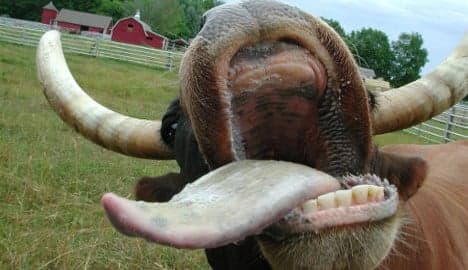
Ever wondered why the French curse the way they do? Hattie Ditton tries to get to the bottom of "merde" and a few other swear words.
Sacré bleu!
This phrase (actually written "sacrebleu" in French) originally came from the once highly offensive "Sacré Dieu" (Holy God), a phrase many considered to be blasphemous.
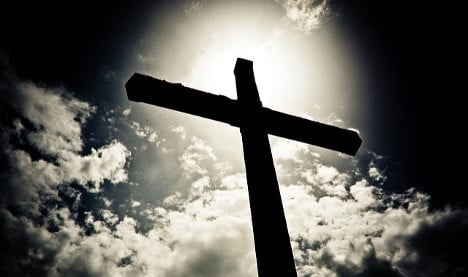 Photo: Tallapragada/Flickr
Photo: Tallapragada/Flickr
READ ALSO: Sacré bleu - Do the French really say that?
Over time, people changed it to “Sacré bleu”, in order to get away with using the profanity - and it seemed to stick. Nowadays, you'll only hear it ironically or from an elderly family member, in the same way that someone may use ‘golly gosh’. But a word of advice, you're more likely to make someone laugh than offend them by using this phrase - so if you're hoping to sound cool with your French, maybe give this one a miss.
Zut!
If you've ever heard someone trying to impersonate a Frenchman, you've probably heard "Zut alors" - but you'll rarely hear it from an actual French person. However, you will still hear ‘zut’ being muttered.
 Zut alors... a phrase for a French imitator. Photo: Photonquantique/Flickr
Zut alors... a phrase for a French imitator. Photo: Photonquantique/Flickr
It is widely agreed that the phrase has been made up of two elements: One suggestion is that it is from the expression ‘allons, hut’, which from as early as 1791 was used by peasants as a vulgar way of expressing ‘come on, stop!’ The ‘z’ then comes from the liaison of the ‘s’ with beginning of ‘hut’. Another alternative is that it is the fusion of words ‘zest’ and ‘flûte, two terms of exasperation.
Others say it's a toned down euphemism for rather stronger ‘foutre’, meaning ‘fuck’. Either way, the word is hardly vulgar at all and would be the equivalent of ‘damn!’ in English.
Oh la vache!
This is a particularly unusual expression for a non-French speaker. It literally translates to “Oh the cow!” It apparently dates back to the seventeenth century, when farmers would bring cows into towns and villages to ensure the milk they were selling was fresh.
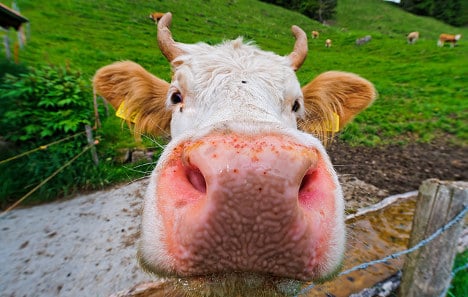
Photo: Tambako The Jaguar/Flickr
This would be met by exclamations of “Oh la vache!” by the bourgeois people of the town. Since then, it has wormed its way into everyday conversation, to express shock or horror and is used frequently by French people of all ages.
Merde
An old French favourite, ‘merde’ hasn’t always meant what it does today, which most of us know as the equivalent to ‘shit’ in English. In fact, it comes from theatre performances from as far back as the 19th century where the elite would travel by horse and carriage and then leave their horse out the front.
Spectators would have to walk through the 'merde' to get inside, and the more manure that was traipsed into the theatre meant more ticket buyers (and in turn a better show). The merde became associated with good fortune.
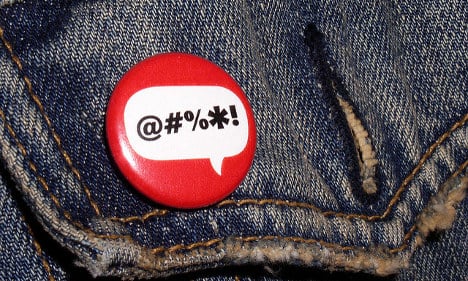 Photo: debaird/Flickr
Photo: debaird/Flickr
It then became commonplace to wish actors luck with this word. Still today, you may hear people wishing each other luck in an exam or performance by saying ‘merde’.
Putain
Possibly the most commonly used French expletive, ‘Putain’ comes from ‘put’, meaning dirty, which in turn is derivative of verb ‘puer’ which means ‘to smell bad’. ‘Putain’ translates to “whore” or "prostitute”. Knowing this, it can seem shocking when you first hear it being thrown about in the street (which you will frequently).
 Photo: David Goehring/Flickr
Photo: David Goehring/Flickr
READ ALSO: An ode to the greatest French swear word
However, the meaning that it has taken on nowadays is probably no stronger than English ‘crap’, so don't be too perturbed. In fact, unless you hear someone calling a woman a ‘sale putain’ (dirty whore); then there's no need for concern if you hear the word at all. Otherwise, young and old alike use this word as both a positive or negative exclamation.
Oh là là!
Everyone in the world knows the French phrase Oh là là. But where did it come from? And do people really say it? Yes they do! However, even French people will tell you that it has no real meaning. It seems no one actually knows where it came from but is just one of those things they say.
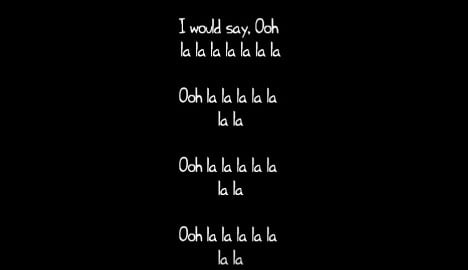
READ ALSO: Oh la la - how to use the best three words in French
Or if they are really surprised, they'll say ‘oh la la la la la la’. Basically, the more shocking the revelation, or the deeper the admiration, the more ‘la’s will be added. We have taken to using it in English, but with our own, slightly risqué-er connotations. Even songs have been written with this as their title. Pretty impressive for an expression with ‘no meaning’.
By Hattie Ditton
Comments
See Also
Sacré bleu!
This phrase (actually written "sacrebleu" in French) originally came from the once highly offensive "Sacré Dieu" (Holy God), a phrase many considered to be blasphemous.
 Photo: Tallapragada/Flickr
Photo: Tallapragada/Flickr
READ ALSO: Sacré bleu - Do the French really say that?
Over time, people changed it to “Sacré bleu”, in order to get away with using the profanity - and it seemed to stick. Nowadays, you'll only hear it ironically or from an elderly family member, in the same way that someone may use ‘golly gosh’. But a word of advice, you're more likely to make someone laugh than offend them by using this phrase - so if you're hoping to sound cool with your French, maybe give this one a miss.
Zut!
If you've ever heard someone trying to impersonate a Frenchman, you've probably heard "Zut alors" - but you'll rarely hear it from an actual French person. However, you will still hear ‘zut’ being muttered.
 Zut alors... a phrase for a French imitator. Photo: Photonquantique/Flickr
Zut alors... a phrase for a French imitator. Photo: Photonquantique/Flickr
It is widely agreed that the phrase has been made up of two elements: One suggestion is that it is from the expression ‘allons, hut’, which from as early as 1791 was used by peasants as a vulgar way of expressing ‘come on, stop!’ The ‘z’ then comes from the liaison of the ‘s’ with beginning of ‘hut’. Another alternative is that it is the fusion of words ‘zest’ and ‘flûte, two terms of exasperation.
Others say it's a toned down euphemism for rather stronger ‘foutre’, meaning ‘fuck’. Either way, the word is hardly vulgar at all and would be the equivalent of ‘damn!’ in English.
Oh la vache!
This is a particularly unusual expression for a non-French speaker. It literally translates to “Oh the cow!” It apparently dates back to the seventeenth century, when farmers would bring cows into towns and villages to ensure the milk they were selling was fresh.

Photo: Tambako The Jaguar/Flickr
This would be met by exclamations of “Oh la vache!” by the bourgeois people of the town. Since then, it has wormed its way into everyday conversation, to express shock or horror and is used frequently by French people of all ages.
Merde
An old French favourite, ‘merde’ hasn’t always meant what it does today, which most of us know as the equivalent to ‘shit’ in English. In fact, it comes from theatre performances from as far back as the 19th century where the elite would travel by horse and carriage and then leave their horse out the front.
Spectators would have to walk through the 'merde' to get inside, and the more manure that was traipsed into the theatre meant more ticket buyers (and in turn a better show). The merde became associated with good fortune.
 Photo: debaird/Flickr
Photo: debaird/Flickr
It then became commonplace to wish actors luck with this word. Still today, you may hear people wishing each other luck in an exam or performance by saying ‘merde’.
Putain
Possibly the most commonly used French expletive, ‘Putain’ comes from ‘put’, meaning dirty, which in turn is derivative of verb ‘puer’ which means ‘to smell bad’. ‘Putain’ translates to “whore” or "prostitute”. Knowing this, it can seem shocking when you first hear it being thrown about in the street (which you will frequently).
 Photo: David Goehring/Flickr
Photo: David Goehring/Flickr
READ ALSO: An ode to the greatest French swear word
However, the meaning that it has taken on nowadays is probably no stronger than English ‘crap’, so don't be too perturbed. In fact, unless you hear someone calling a woman a ‘sale putain’ (dirty whore); then there's no need for concern if you hear the word at all. Otherwise, young and old alike use this word as both a positive or negative exclamation.
Oh là là!
Everyone in the world knows the French phrase Oh là là. But where did it come from? And do people really say it? Yes they do! However, even French people will tell you that it has no real meaning. It seems no one actually knows where it came from but is just one of those things they say.

READ ALSO: Oh la la - how to use the best three words in French
Or if they are really surprised, they'll say ‘oh la la la la la la’. Basically, the more shocking the revelation, or the deeper the admiration, the more ‘la’s will be added. We have taken to using it in English, but with our own, slightly risqué-er connotations. Even songs have been written with this as their title. Pretty impressive for an expression with ‘no meaning’.
By Hattie Ditton
Join the conversation in our comments section below. Share your own views and experience and if you have a question or suggestion for our journalists then email us at [email protected].
Please keep comments civil, constructive and on topic – and make sure to read our terms of use before getting involved.
Please log in here to leave a comment.